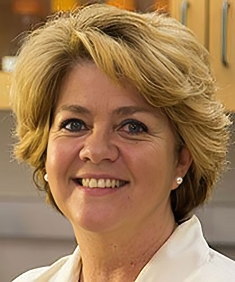
How do modern lifestyle practices—from the way we eat to the way we treat diseases—impact the human microbiome? That's the question leading the research interests of Maria Gloria Dominguez-Bello, whose most recent work centers on how the microbiomes of babies born vaginally can differ from those delivered via cesarean section. "Babies born via C-section bypass the birth canal, and therefore miss their first exposure to the microbes there," she explains. "This research attempts to restore this exposure and measure the effect on the microbiome."
So far, she has studied babies in Puerto Rico, New York, Spain, and Chile. Preliminary results show that there are indeed differences in the microbiome of C-section babies, and that a restoration method can work. "If we can understand what is driving immunity disorders—asthma, allergies, celiac, and others—and which microbes are needed at what age, we can try to restore them," Dominguez-Bello says of future translational impacts. "The real probiotics are yet to come."
View the article at the SEBS/NJAES Newsroom